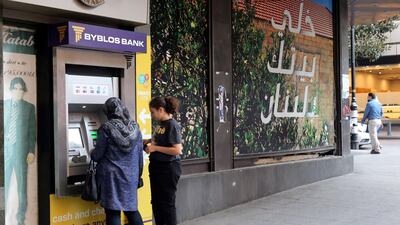Two of the big three ratings agencies issued downgrades to Lebanese bank ratings following measures taken by the country's central bank to address its economic crisis.
Moody’s Investors Service said emergency measures taken by Lebanon’s central bank to address foreign-currency shortages had forced three of the country’s biggest lenders into a “deposit default”.
Bank Audi, Blom Bank and Byblos Bank also had their baseline credit assessments, or BCAs, downgraded to the second-lowest level in what Moody’s said wasn’t a credit rating action, according to Bloomberg. Moody's described BCAs as an opinion on “issuers’ standalone intrinsic strength” - i.e. without any government or external support.
“The downgrade is driven by the payment of part of the interest for foreign currency deposits in local currency by banks in Lebanon following instructions by the country’s central bank, which constitutes a deposit default based on the rating agency’s own definitions,” Moody's said in a statement.
Meanwhile, Fitch Ratings also downgraded Bank Audi and Byblos Bank's long- and short-term Issuer Default Ratings to 'RD' (Restricted Default) from their previous ratings of CCC- and C, respectively.
It also cited Banque du Liban's action restricting interest payments on foreign currencies to Lebanese pounds,
"These measures indicated increasing funding and currency stress in the country and are undertaken by BDL to limit pressures on the country's currency reserves and banking sector," Fitch Ratings said.
The agency also downgraded both banks' viability ratings to 'f' from 'ccc-', which it said reflected "Fitch's view that the banks have failed and would have defaulted had capital controls not been imposed given the high appetite for withdrawals and the lack of confidence in the banking system".
Lebanon is facing its worst financial crisis in decades and its central bank last week told local banks to pay half of foreign currency deposits in Lebanese pounds. It is planning to do the same for what it owes to banks on dollar-denominated deposits and certificates of deposits.
Moody’s said the banks remain on review for downgrade, whereas Fitch removed its negative ratings watch on the two lenders it issued downgrades against.
Lebanon has been gripped by nationwide protests for the past two months with citizens demanding reforms and changes in the political system that has governed the country since the end of a 15-year civil war in 1990. The protests are the largest the country has seen since the assassination of former prime minister Rafik Hariri in 2005, which led to Syria withdrawing its troops from Lebanon after a 29-year presence there.
Citizens blame Lebanon’s political elite for widespread corruption and nepotism, which they say contributed to the country accruing $86bn of public debt equivalent to 150 per cent of GDP debt.
The crisis has led to the Lebanese pound losing about 20 per cent of its value against the US dollar in the local black market.

